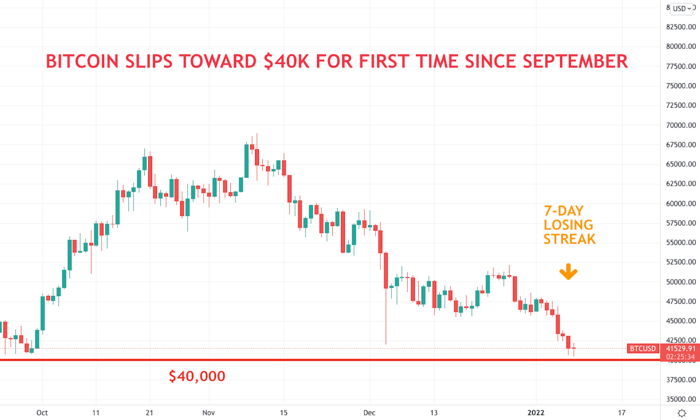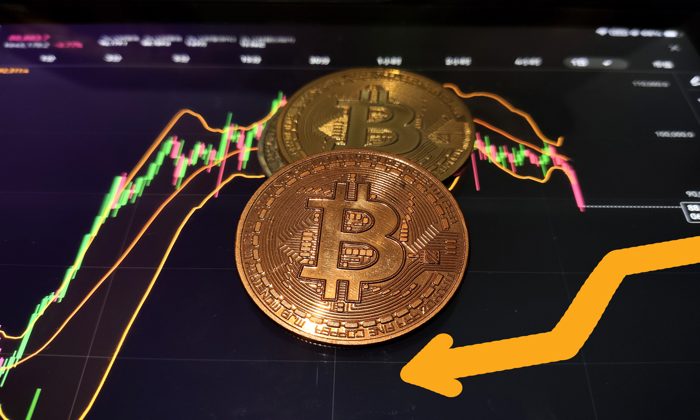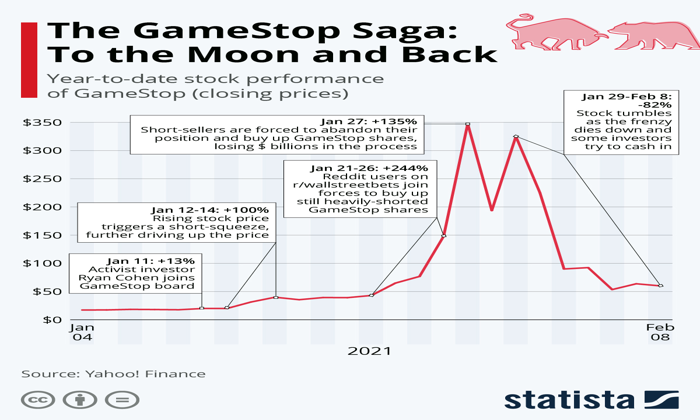The recent Bitcoin price fall has sent shockwaves through the cryptocurrency market, with values dipping below $77,000 amid growing concerns over upcoming tariffs imposed by the Trump administration. As the White House prepares to implement steep tariffs, including a staggering 50% on Chinese imports, traders are increasingly apprehensive, leading to a notable crypto price drop. This fallout has been reflected in Bitcoin news, with analysts monitoring the situation closely for potential impacts on Bitcoin trading strategies. The price plummeted around 2% in just a day, showcasing how external economic pressures can significantly affect digital currencies. With a turbulent trading environment ahead, investors are left questioning the resilience of Bitcoin in this volatile market.
The decline in the value of the leading digital currency has raised alarms among traders and investors alike, particularly as geopolitical factors continue to exert pressure on the cryptocurrency landscape. Known primarily as Bitcoin’s recent downturn, this trend can be viewed as part of a larger narrative regarding fluctuating crypto assets, impacted largely by external forces such as governmental economic policies. As Bitcoin experienced a rapid descent, discussions surrounding market volatility and its ramifications became increasingly pertinent. The implications of such market movements, especially in light of recent tariff announcements, suggest a deeper analysis of investment strategies in the crypto domain is necessary. In this complex financial climate, understanding the causes and consequences of downturns like the one currently affecting Bitcoin is vital for future trading decisions.
Understanding the Impact of Trump Tariffs on Bitcoin Prices
The recent decline in Bitcoin prices can be closely tied to the unfolding trade war initiated by President Trump. As he imposed reciprocal tariffs on various nations, market analysts noted a parallel decrease in the cryptocurrency’s value, as heightened economic uncertainty tends to curb investor confidence. Given that Bitcoin is often considered a safe haven asset, its price movements can reflect broader market trends influenced by legislative changes and economic forecasts.
Specifically, as tariffs on imports increase, the resulting inflationary pressures could lead to reduced spending power for average consumers. This scenario could negatively impact the demand for cryptocurrencies, resulting in a price drop like the recent fall of Bitcoin below $77,000. Furthermore, as countries like Canada retaliate against U.S. tariffs with their own measures, the global economic landscape becomes increasingly volatile, which can further destabilize the cryptocurrency market.
Crypto Market Reactions to Global Trade Policies
In the wake of Trump’s tariff announcements, the cryptocurrency market has shown notable volatility. Bitcoin’s recent trading behavior, fluctuating around $76,500, reflects not just its intrinsic market dynamics but also broader geopolitical tensions. Investors are keenly aware that decisions made within the trade sphere can heavily impact asset valuations, including those of Bitcoin and competing cryptocurrencies. The anticipation surrounding trade developments can lead to speculative trading behavior, heightening both random sell-offs and subsequent price recoveries.
Moreover, a significant price drop in Bitcoin could indicate a shift in sentiment among crypto investors, as they may be looking for stability amid a tumultuous trading environment. As news filters in about the potential implications of Trump’s tariffs on the cryptocurrency market, traders are left to navigate these mixed signals, weighing immediate price reactions against longer-term strategies. In this complex landscape, the announcement of further negotiations by U.S. Treasury officials might either bolster confidence or stoke uncertainty in the crypto market.
Analyzing Recent Bitcoin News and Price Trends
The latest Bitcoin news indicates a worrying trend for investors, with the cryptocurrency experiencing a sharp decline as its price fell from above $80,000 to around $76,500 in a single day. This fluctuation has highlighted the sensitivity of the crypto market to external financial pressures, including those stemming from Trump’s tariffs. Such price trends are critical for investors who closely monitor market activity, seeking to make informed decisions based on current valuation trends.
As Bitcoin confronts this challenging backdrop, the discussions surrounding its value in comparison to traditional assets become increasingly relevant. The recent instability is reminiscent of past periods in which global economic factors precipitated dramatic shifts in cryptocurrency valuations. Investors must remain vigilant, given that the impact of broader economic policies on Bitcoin could lead to significant losses or gains in the near future.
Bitcoin Trading Strategies During Uncertain Times
As the trade war intensifies and Bitcoin prices fluctuate, traders are adapting their strategies to navigate this complex environment. When faced with the news of Trump’s tariffs and its implications on the broader economy, many investors are reconsidering their positions on Bitcoin. Some may choose to adopt a cautious approach, waiting out the volatility while others may see this as an opportunity to buy at lower prices, betting on a recovery.
Effective trading strategies in uncertain times often involve risk management techniques and the understanding of market sentiment. Traders might diversify into a broader range of cryptocurrencies or even traditional assets to mitigate potential losses from Bitcoin’s price dips. Keeping abreast of news related to tariffs and their repercussions on both crypto and traditional markets is vital for making strategic trading decisions.
The Role of ETFs in Shaping Bitcoin Prices
The introduction of exchange-traded funds (ETFs) linked to Bitcoin and other cryptocurrencies continues to shape market dynamics. With financial giants like BlackRock turning to custodians like Anchorage Digital, the institutional interest in Bitcoin is on the rise. This interest not only provides liquidity but also informs the pricing mechanisms of Bitcoin, as ETFs can facilitate more consistent buying patterns amid market fluctuations.
However, as Bitcoin experiences price drops due to external factors like tariffs, the overall performance of ETFs may also be impacted. Institutional investors are particularly sensitive to market inefficiencies that arise from geopolitical events, such as the imposition of tariffs, which can lead to reduced investor confidence. Understanding how ETFs operate in correlation with Bitcoin prices will be essential for predicting future trends in this volatile market.
Inflation and Bitcoin: An Intertwined Relationship
The looming threat of inflation, exacerbated by Trump’s tariff policies, has direct implications for Bitcoin values. As tariffs drive up costs for imported goods, consumers may face rising prices, leading to decreased disposable income. This squeezed financial situation could result in reduced investment in assets like Bitcoin, contributing to a notable price fall in the cryptocurrency market.
Moreover, Bitcoin has often been touted as a hedge against inflation, leading many investors to reassess their positions during periods of economic uncertainty. If inflation continues to rise, the demand for Bitcoin may shift, as investors might flock to its decentralized nature to preserve wealth. Observing inflation trends while monitoring Bitcoin’s market behavior will be crucial for understanding its potential as a value storage mechanism.
Comparing Bitcoin’s Volatility to Other Cryptocurrencies
Bitcoin’s volatility is often contrasted with that of altcoins, especially during times of economic upheaval. While Bitcoin has recently experienced a price fall below $77,000, altcoins may react differently to the same economic stimuli, making comparisons essential. Understanding these differences can provide insights into overall market trends and the potential directions for cryptocurrency investments.
During significant market corrections or reactions to news like Trump’s tariffs, Bitcoin tends to lead the way, with other cryptocurrencies following suit. This behavior can draw in investors seeking to capitalize on trends, leading to increased volatility across the cryptocurrency market. By comparing the price movements of Bitcoin with those of other cryptocurrencies, investors can formulate strategies that leverage these market dynamics effectively.
Future Perspectives for Bitcoin Amid Tariff Negotiations
As negotiations regarding Trump’s tariffs continue, the future of Bitcoin remains uncertain. Analysts suggest that the outcome of these discussions could have lasting effects on the cryptocurrency market, given that investors are closely monitoring developments. A resolution to the trade tensions might lead to a renewed sense of confidence among traders, potentially stabilizing Bitcoin’s price in the short term.
On the contrary, if negotiations drag on with no clear resolution, we might see a further decline in Bitcoin prices, exacerbating concerns over economic stability and investor sentiment. Therefore, it is critical for market participants to stay informed and ready to adjust their strategies according to the outcomes of these pivotal discussions.
Market Sentiment and its Influence on Bitcoin Pricing
Market sentiment plays a foundational role in determining Bitcoin prices, and this dynamic has become particularly pronounced in light of recent tariff announcements. The psychological reactions of investors to geopolitical developments can lead to sharp price fluctuations, creating an environment ripe for trading opportunities. As news unfolds regarding Trump’s tariffs, the sentiment around Bitcoin can shift dramatically, affecting both short-term movements and long-term investments.
Understanding the prevailing sentiment is essential for investors and traders alike. Monitoring social media, news outlets, and trading forums can provide valuable insights into how market participants are feeling, allowing traders to make informed decisions. Consequently, the interplay of sentiment and price action serves as a crucial factor in navigating the intricacies of Bitcoin trading during tumultuous times.
Frequently Asked Questions
What caused the recent Bitcoin price fall related to Trump tariffs?
The recent Bitcoin price fall can be attributed to investors’ concerns over the enforcement of steep tariffs imposed by President Trump, which are expected to impact the cryptocurrency market. As tariffs on U.S. imports, especially from China, were set to rise significantly, traders reacted to the uncertainty, causing Bitcoin to drop below $77,000.
How do Trump tariffs affect Bitcoin trading and prices?
Trump tariffs have a direct impact on Bitcoin trading and prices as they create economic uncertainty. When tariffs increase, investors may look to sell off risky assets like cryptocurrencies. This has been reflected in the recent crypto price drop, which saw Bitcoin’s value decrease as the markets reacted to the upcoming tariffs.
Can the Bitcoin price fall be linked to the broader cryptocurrency market trends?
Yes, the Bitcoin price fall reflects broader trends in the cryptocurrency market. The announcement of Trump’s tariffs and their potential economic implications led to heightened volatility in crypto prices, impacting not only Bitcoin but also other digital currencies.
What are analysts saying about the current Bitcoin news regarding price fluctuations?
Analysts have indicated that while the Bitcoin price fell due to potential trade wars and tariffs, the reaction has been relatively mild compared to past market sell-offs. Some suggest Bitcoin may undergo a period of sideways movements or further declines as market sentiments remain cautious.
How is Bitcoin affected by geopolitical events like trade tariffs?
Geopolitical events, such as trade tariffs imposed by leaders like President Trump, can create uncertainty in financial markets, leading to a bearish sentiment in Bitcoin and the larger cryptocurrency market. As investors respond to potential economic pressures, this often results in a crypto price drop.
What should investors watch for following the recent Bitcoin price fall?
Investors should pay attention to ongoing negotiations related to Trump’s tariffs and any economic data releases that could influence market sentiments about inflation and trade. These factors will be crucial in determining if the Bitcoin price experiences further declines or stabilizes.
Is the Bitcoin price fall a sign of a longer-term trend in cryptocurrency markets?
While the current Bitcoin price fall is influenced by external factors like tariffs, it may not necessarily indicate a longer-term bearish trend. Market conditions can rapidly change based on political and economic developments, so staying informed on Bitcoin news and market trends is essential.
What measures can investors take during a Bitcoin price fall due to economic pressures from tariffs?
During a Bitcoin price fall related to economic pressures from tariffs, investors may consider diversifying their portfolios, setting stop-loss orders, or closely monitoring market trends for informed trading decisions. Being proactive and informed can help mitigate losses during volatile periods.
How can Trump’s trade policies impact the future of Bitcoin and cryptocurrency?
Trump’s trade policies, particularly through tariffs, can influence investor sentiment and market stability. As seen with recent price movements, such policies can lead to uncertainty, which may affect the demand and overall health of the Bitcoin and cryptocurrency market in the long term.
| Key Points | Details |
|---|---|
| Bitcoin Price Drop | Bitcoin fell below $77,000 as tensions rose due to impending tariffs. |
| Trump’s Tariffs | Initial 10% tariff on U.S. imports; China facing additional 50% tariff, totaling 104%. |
| Market Reaction | BTC price decreased by approximately 2% over 24 hours after peaking over $80,000. |
| Negotiations with Countries | Ongoing negotiations with over 50 affected countries, with Canada planning 25% tariffs. |
| Impact on Stock Market | Concerns over consumer finances and global economic slowdown led to declines in Nasdaq and S&P 500. |
| Future Indicators | Investors are awaiting inflation data related to Trump’s tariffs from the U.S. Bureau of Labor Statistics. |
Summary
The recent Bitcoin price fall highlights investor concerns as key deadlines for Trump’s “reciprocal” tariffs approach. With the cryptocurrency dropping below $77,000 amid escalating trade tensions and significant tariffs on U.S. imports, market participants are cautious about the future. The ramifications of these tariffs may strain both consumer finances and global economic growth, prompting further volatility in digital assets such as Bitcoin.
Bitcoin price fall has sent shockwaves through the cryptocurrency market this week, as the digital asset dipped below $77,000 amid escalating tensions surrounding President Trump’s tariffs. Investors have been closely monitoring the situation, particularly as the White House readies to impose hefty reciprocal tariffs on multiple countries, raising concerns of a broader economic impact. Initially peaking over $80,000, Bitcoin’s rapid decline serves as a chilling reminder of the volatility inherent in crypto trading. As news of these tariffs continues to unfold, analysts are left to speculate on the potential ramifications for Bitcoin prices and the overall market sentiment. This latest Bitcoin news emphasizes the intricate relationship between global trade dynamics and the performance of cryptocurrencies in today’s financial landscape.
The recent downturn in Bitcoin’s valuation marks a significant trend in the cryptocurrency sector, reflecting broader concerns within the financial ecosystem. As the market reacts to trade negotiations and tariff regulations set forth by the U.S. administration, many investors are experiencing heightened anxiety regarding the repercussions on crypto assets. This sudden crypto price drop may compel traders to reconsider their strategies, as they navigate the complexities of this shifting environment. With heightened uncertainty surrounding economic policies, the implications for Bitcoin trading and investment decisions are more critical than ever. As such, staying informed about the evolving landscape of digital currencies remains essential for participants in this dynamic market.















